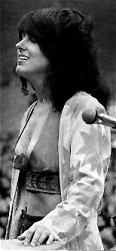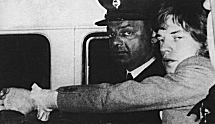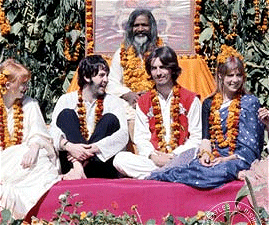Sixties
City presents
a wide-ranging series of
articles on all aspects of the Sixties, penned by the creator of the iconic
60s music paper Mersey
Beat
|
Sixties
City presents
a wide-ranging series of
articles on all aspects of the Sixties, penned by the creator of the iconic
60s music paper Mersey
Beat
|
|||||
|
| The
exciting decade of the Sixties reached its apogee in 1967. London still
swung, but the city that had now taken up the baton was San Francisco, which
became the Mecca of flower power and was known as the ‘city of love.’ It housed the hippie movement, based in the Haight-Ashbury district, and the popular songs at the time included ‘Let’s Go To San Francisco’ by The Flowerpot Men and ‘San Franciscan Nights’ by Eric Burdon. At the height of the season known as ‘the summer of love', Scott Mackenzie topped the charts with ‘San Francisco'. On 14th January 20,000 hippies turned up for the first ‘Human Be-In’, called ‘The Gathering of the Tribes Festival’ in San Francisco’s Golden Gate Park. They were entertained by a host of new bands who created what was to become known as the ‘West Coast Sound’ and included the Grateful Dead, Jefferson Airplane and Quicksilver Messenger Service. It was a celebration of Love and Peace and also a protest against the escalating war in Vietnam. West Coast rock seemed to flourish throughout the year, with further San Francisco-based bands such as Country Joe & The Fish and Big Brother & The Holding Company, with singer Janis Joplin, appearing at the biggest outdoor festival of 1967 – the Monterey Pop Festival in June. The word 'hippie' was a term derived from the jazz form ‘hip’ – to be aware of what’s going on. They comprised mainly white middle-class youngsters in their teens and early twenties, who rejected the ‘rat race’ and quest for material gain. They dressed in colourful clothes, wore their hair long, were pacifistic by nature and loved dancing and rock music. They were part of a drug culture who believed that marijuana was less harmful than alcohol. They also took LSD, although they rejected hard drugs such as heroin. The hippies were also known as 'flower children'. Their spiritual home was a district at the intersection of Haight and Ashbury Streets, which was the centre of their counter culture lifestyle. There was music in the streets, widespread use of LSD and pot, with bearded youths and pretty girls in colourful clothes arriving from all parts of America. ‘Head Shops’ sprung up which sold hand-made jewellery, leather and bead wear – and also pipes, roach holders and other accessories for drug users. |
 |
Monterey Pop Festival 1967
Friday 16th June The Association, The Paupers, Lou Rawls, Beverly, Johnny Rivers, The Animals, Simon and Garfunkel Saturday 17th June Canned Heat, Big Brother & The Holding Company, Country Joe & The Fish, Al Kooper, The Butterfield Blues Band, Quicksilver Messenger Service, Steve Miller Band, The Electric Flag, Moby Grape, Hugh Masekela, The Byrds, Laura Nyro, Jefferson Airplane, Booker T and The MG's, Otis Redding Sunday 18th June Ravi Shankar, The Blues Project, Big Brother & The Holding Company, The Group With No Name, Buffalo Springfield, The Who, The Grateful Dead, The Jimi Hendrix Experience, Scott Mackenzie, The Mamas & The Papas |
 |
The
media descended on the area and it became commercially exploited and over-run
with tourists. There were even bus trips called ‘Hippie-hop'. Disillusioned,
the hippies held an official ceremony ‘Death of Hippie’ on 6th October 1967,
a date that also saw the first anniversary of LSD being made illegal – the
party was over!October was quite eventful. The same month San Francisco saw the launch of 'Rolling Stone', an influential voice of the rock sub-culture, founded by a 21-year-old ex-student Jann Wenner; Alan Ginsberg - who’d coined the phrase ‘flower power’ - led thousands of marchers to Washington DC in an attempt to levitate the Pentagon. The Grateful Dead were busted at their Ashbury Street home – and the counter culture icon Che Guevara was murdered in Bolivia. Guevara, the South American revolutionary had been involved in uprisings in Guatemala and Mexico, had joined Fidel Castro in 1955 and trained his guerrillas. Although appointed to high administrative positions in the new Cuban government he continued to seek causes and left Cuba for the Congo, and later Bolivia, where he was shot by the authorities. He had become a legendary figure on university campuses and his image was featured on posters and T-shirts throughout the world. |
 |
In
Britain, further attention was given to the drug when Paul McCartney of
the Beatles admitted publicly to taking LSD. The high-profile drug bust
of the year took place in February when police raided Redlands, the home
of Rolling Stone member Keith Richards. Also present at the Sussex house
were Mick Jagger and his girlfriend Marianne Faithfull and Brian Jones.
Jagger and Richards were charged with drug possession and the police also
raided Brian Jones’ London flat, resulting in charges against him. The trial
took place in June and Jagger and Richards were both found guilty and sentenced
to three months and one year in jail, respectively. The media were outraged by what they regarded as an unduly severe sentence and The Times printed a famous editorial in their defence, ‘Who Breaks a Butterfly On A Wheel?’ Their sentences were quashed the following month. In October Brian Jones was sentenced to nine months imprisonment, although the sentence was revoked the following month. Although the spotlight had turned to San Francisco, 1967 still proved to be a major year for British music. Chas Chandler of The Animals had discovered guitarist Jimi Hendrix in America, brought him to England – and launched his career from London. |
| The
‘psychedelic’ movement proved to be influential, with the formation of groups
such as the Pink Floyd, events such as the 14-hour Technicolour Dream at
the Alexandra Palace, ‘Legalise Pot’ rallies in Hyde Park and surrealistic
records such as Procol Harum’s ‘A Whiter Shade of Pale’. Sandie Shaw won
the Eurovision Song Contest for Britain with ‘Puppet on a String’ and pirate
radio stations, now declared illegal, led to the founding of the BBC’s Radio
One. To promote their new single ‘Flowers in the Rain’, Birmingham hit group
The Move had sent out a promotional post card featuring Prime Minister Harold
Wilson in the nude. He took them to court, resulting in all their royalties
for the record being donated to charity. It was a momentous year for the Beatles, which began with the release of their single ‘Penny Lane’/’Strawberry Fields Forever’. In June they released what is generally regarded as the greatest pop album ever made – ‘Sgt Pepper’s Lonely Hearts Club Band’. The same month they appeared on ‘Our World’, a spectacular television production that was transmitted live throughout the world by satellite, with the largest television audience ever up to that time – 400,000,000 people. The Beatles contribution was to perform their new single live – ‘All You Need Is Love’. The group met up with the Maharishi Mahesh Yogi and joined his ‘Spiritual Regeneration’ movement. The Maharishi, born in 1919, had developed a way of making an ancient form of meditation more palatable and marketable for the West in the shape of Transcendental Meditation. He had originally arrived in London in 1959 to found the International Meditation Society and by 1967 the movement boasted 10,000 British members. Tragically, within days of meeting the Maharishi, the Beatles received news that their manager Brian Epstein had been found dead. In September they travelled round the South of England in a multi-coloured coach filming ‘Magical Mystery Tour’ which, when screened on television in December, was universally panned by the critics, the first critical mauling the Beatles had ever received. Meanwhile, in America, Elvis Presley married his sweetheart Priscilla in Las Vegas. The Summer of Love was over and a darker view of life loomed on the horizon. In December two American radicals, Abbie Hoffman and Jerry Rubin, formed the 'Yuppies'. It stood for the Youth International Party and Rubin described it as ‘guerrilla theatre media politics’. The atmosphere of hope and expectation, which the decade of the Sixties had fostered, reached its peak in 1967 and then began to fade. |
 |
|
Article
Text
UK
web hosting by
|